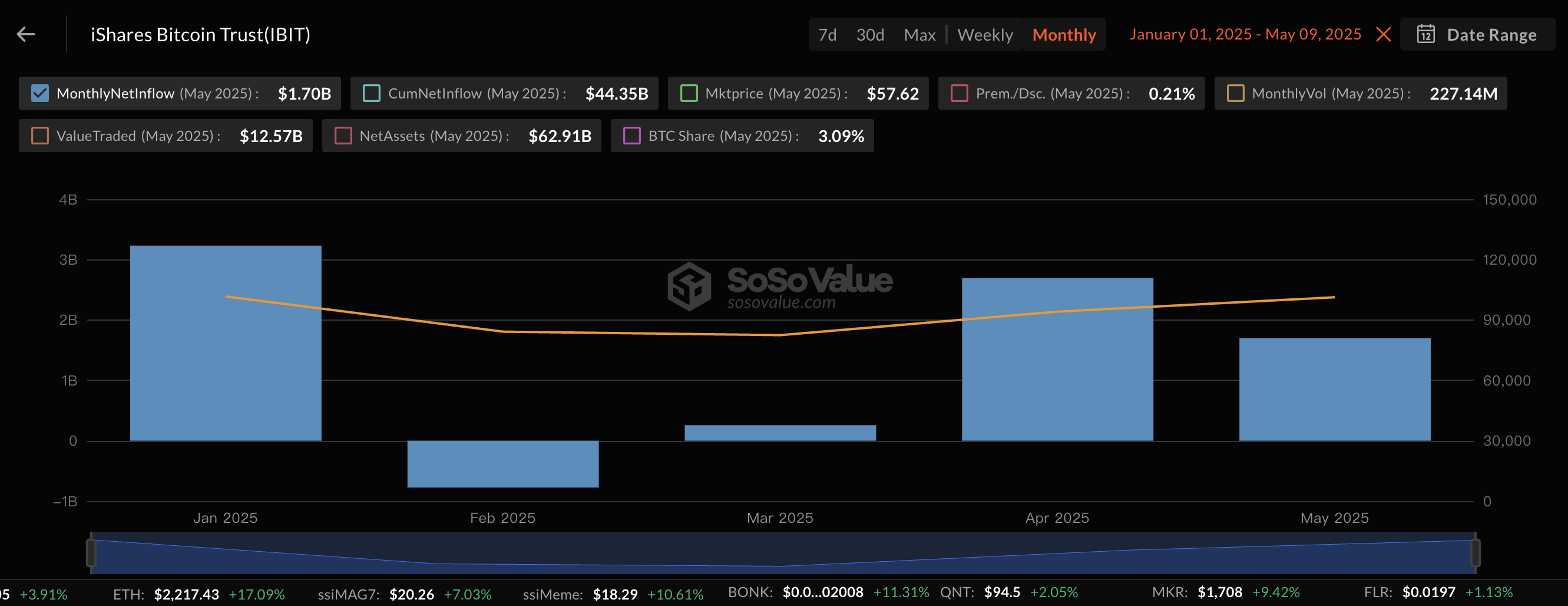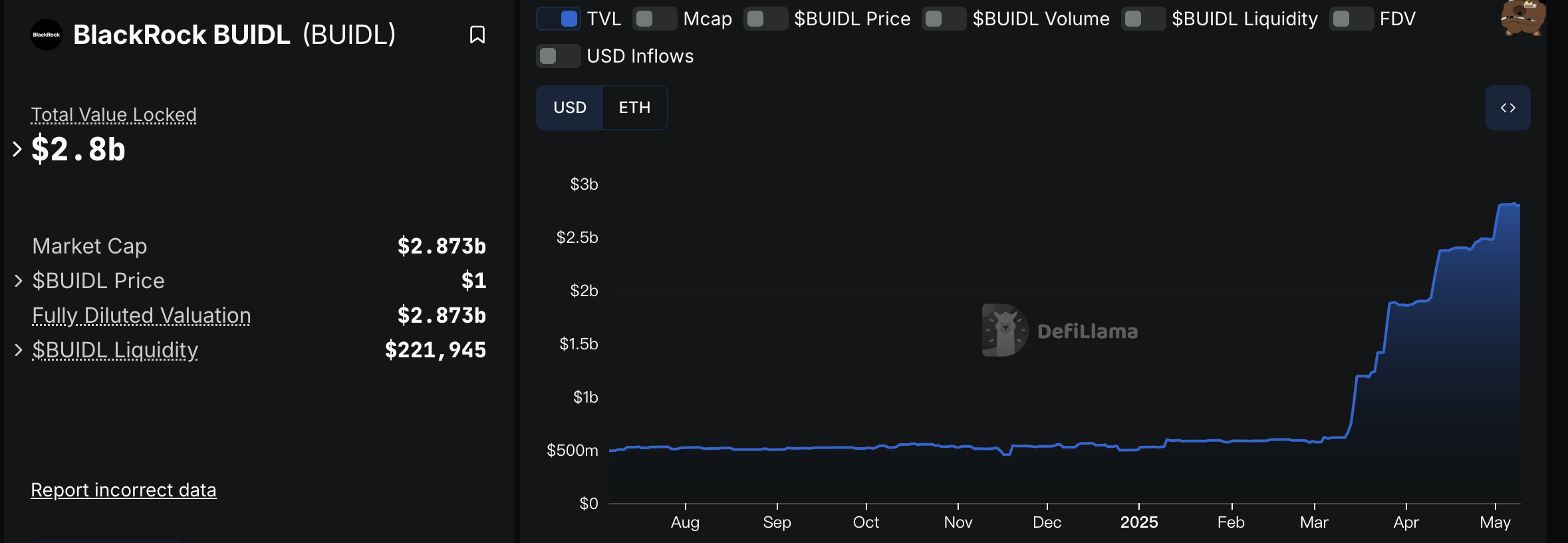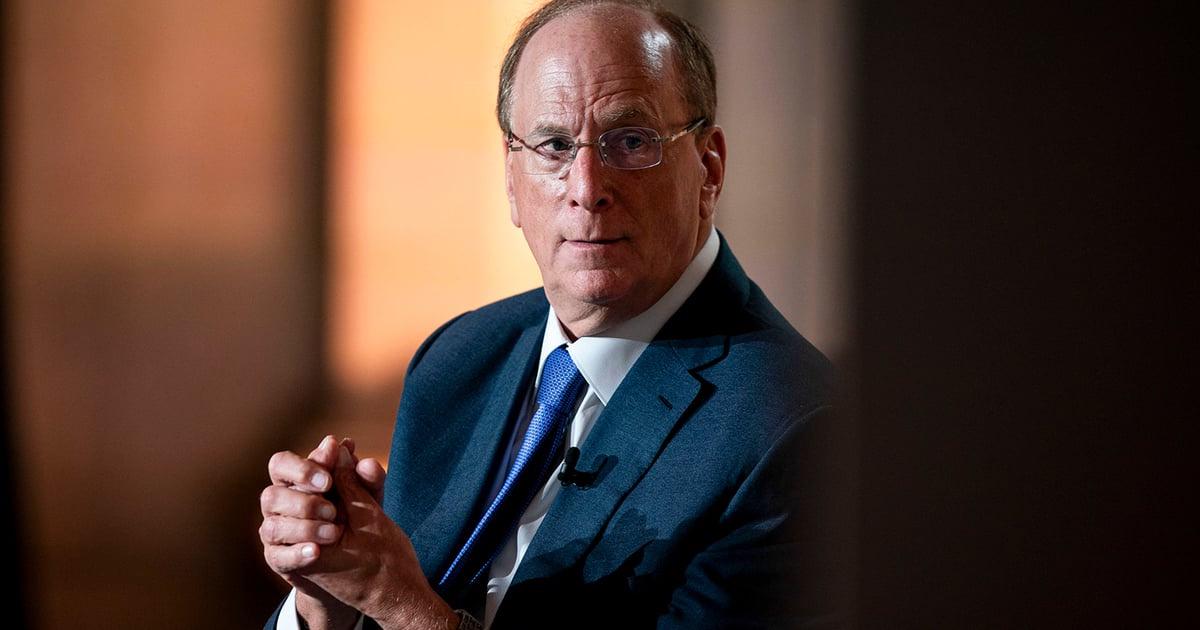Author: Nancy, PANews
A piece of news about "BlackRock's IBIT seeing inflows surpassing the world's largest gold fund this year" coincides with Bitcoin's return to $100,000 on May 8, becoming the focus of market attention.
Bitcoin ETFs have taken the lead in the crypto community, making Wall Street an important buyer of Bitcoin, pushing this once-marginal asset into mainstream acceptance and compliance, and becoming a key piece in BlackRock's global financial landscape.
BlackRock, the world's largest asset management company, manages up to $11.5 trillion in assets. However, this "apparent asset management giant" has long transcended the role of mere asset manager. Known as the "shadow central bank," BlackRock is deeply involved in shaping global capital flows, policy directions, and the construction of systemic financial instruments.
From IBIT to BUIDL, BlackRock's On-Chain Layout
In the order of traditional finance, BlackRock has long been a player that controls the rules of the game. Now, this financial giant is quietly bridging traditional capital and digital assets, attempting to reconstruct the future financial order.
One of the core unresolved issues in the crypto market over the past decade has been "when will the U.S. SEC approve a Bitcoin spot ETF." For this, dozens of institutions have come and gone, but repeatedly hit walls. Until June 2023, when BlackRock officially submitted its Bitcoin spot ETF application, this was not just an application but a catalyst for market confidence. The market quickly realized: when even BlackRock aligns with Bitcoin, regulatory approval is just a matter of time.
In January 2024, the SEC officially approved several Bitcoin spot ETFs, including BlackRock's IBIT. This event not only became a "watershed moment for Bitcoin compliance" but also signified a redistribution of narrative power: BlackRock brought Bitcoin into the mainstream financial arena with an ETF.
After its launch, IBIT quickly attracted massive institutional funds, not only ending Grayscale's GBTC monopoly on Bitcoin exposure but also surpassing the global largest gold ETF, GLD, in capital inflows.

According to publicly available data, from the beginning of this year to now, IBIT has garnered approximately $6.97 billion in net inflows, exceeding GLD's $6.29 billion during the same period. Despite Bitcoin's price increase of only 1.4% during this time, gold rose by 24.9%, yet funds flowed into IBIT against the trend, demonstrating the market's high recognition of its long-term allocation value.
Bloomberg's senior ETF analyst Eric Balchunas pointed out that the continued capital inflow during a period of price weakness confirms Bitcoin's asset allocation value as "digital gold," predicting that the BTC ETF scale will reach three times that of gold ETFs within 3-5 years. Strategy Chairman Michael Saylor even bolder predicted that BlackRock's IBIT will become the world's largest ETF within ten years.
However, IBIT is just the starting point in BlackRock's larger vision. Rather than saying BlackRock is promoting an ETF, it is more accurate to say it is reshaping a new financial infrastructure centered around tokenization.

In March 2024, BlackRock launched the tokenized money market fund BUIDL, becoming its first fully on-chain traditional asset fund. As of May 2025, BUIDL's TVL has surpassed $2.8 billion, firmly holding the top position in the global RWA track, far ahead of competitors like WisdomTree and Franklin Templeton. This also means that BUIDL is no longer an experimental project but a market-validated reality.
Furthermore, BlackRock has recently applied to establish DLT Shares and announced the completion of on-chain mapping for $150 billion in assets, covering diverse fields such as real estate trusts and commodities. This case not only marks the commercialization and scaling of RWA but also extends on-chain finance from marginal experiments to traditional capital markets.
The Comeback of Wall Street's Underdogs
The starting point of it all may trace back to an office in Manhattan in 1986.

That year, Larry Fink was a hotshot trader on Wall Street and the youngest managing director in the history of First Boston, leading the cutting-edge financial innovation of the time—collateralized mortgage obligations (CMOs). However, a miscalculation in an interest rate bet led to losses exceeding $100 million for his firm, plunging his career into a low point. Yet, this financial debacle sparked a profound reflection on risk management and sowed the seeds for BlackRock's future rise.
Two years later, Larry Fink, along with several former colleagues, founded BlackRock Financial Management with the support of Blackstone Group, which is the predecessor of BlackRock, with initial funding of only $5 million. Unlike the high-frequency trading and speculative arbitrage trends that were popular on Wall Street at the time, Larry Fink made risk management the core philosophy. This philosophy later became the underlying logic and moat for BlackRock's sweeping success in the global asset management industry.
With deep insights into the fixed income market and an innovative asset management model, BlackRock quickly emerged. By the end of 1994, BlackRock's assets under management (AUM) surged from $1.2 billion at its inception to $53 billion, and in the same year, it officially spun off from Blackstone Group, rebranding itself as "BlackRock," marking the beginning of true global expansion.
What solidified BlackRock's core moat was not just the scale of its funds but the groundbreaking financial risk analysis platform it developed—the Aladdin system. This risk control and asset allocation analysis platform is hailed as the "super brain" of global capital markets, executing over 5,000 portfolio stress tests daily and calculating 180 million options adjustments weekly, generating up to $1.4 billion in revenue for BlackRock in 2022 alone. More importantly, Aladdin has now become a crucial piece of global financial infrastructure, used by over 200 major financial institutions worldwide, including UBS, Deutsche Bank, the Swiss National Bank, and even the Federal Reserve, managing assets exceeding $20 trillion, nearly equivalent to one-fifth of global GDP. In a sense, BlackRock's influence has transcended the traditional role of an asset manager, becoming a "predictor" of global market sentiment and capital flows.
Moreover, BlackRock has also gained the power of discourse in global capital allocation through its ETF business. After the 2008 housing bubble burst, the market urgently needed a transparent, low-cost, and highly liquid investment tool, and ETFs quickly became a key choice for both institutional and retail investors seeking risk diversification and asset allocation efficiency. Subsequently, in 2009, BlackRock acquired Barclays' BGI for $13.5 billion, gaining the world's largest index fund brand, iShares ETF.
ETFs are not just passive investment tools; they are also channels for international capital allocation. Who gets included in the index can gain liquidity, and BlackRock has become the creator and referee of this global capital game. According to official disclosures, iShares ETF's asset scale has reached $3.3 trillion, managing over 1,400 ETFs, almost covering all major global markets. Through ETFs, BlackRock has gradually infiltrated the shareholder structure of nearly every large publicly listed company in the U.S. According to 2023 data, the three major index fund giants, including BlackRock, are the largest single shareholders of over 90% of S&P 500 companies, becoming the "invisible hand" in the equity structure of American enterprises.
The "Revolving Door," BlackRock's Secret Weapon in Capital Games
What truly brought BlackRock into the global public eye was its role as a "behind-the-scenes central bank" during various financial crises. Particularly during the 2008 global financial crisis, as Lehman Brothers collapsed and AIG teetered on the brink of bankruptcy, the entire financial system was on the verge of collapse. The U.S. Treasury and the Federal Reserve urgently needed an external professional institution that understood asset pricing and could manage the clearing process, and BlackRock took on this hot potato, assisting in the liquidation of bad assets and helping the Federal Reserve design the largest asset rescue plan in history, TARP.
Since then, BlackRock's role has shifted from being just a player in the market to becoming a bridge for policy execution. In 2020, the COVID-19 pandemic once again caused a global market crash, and the Federal Reserve once again called upon this "old friend," intervening directly in the market through ETFs, with the execution of this action being carried out by BlackRock's iShares series funds. This move has been criticized by some as indicating that BlackRock's relationship with the U.S. government is "too close." It can be said that BlackRock is both a private giant in the market and a trusted policy execution tool for the government.
Behind this lies a more secretive system: the revolving door between politics and business.
In the past, many of BlackRock's senior executives took high-ranking positions in U.S. government agencies like the Treasury and the Federal Reserve after leaving the firm, while some officials who had served in the U.S. government would join BlackRock after their tenure. This intertwining of political and business relationships often means a preemptive advantage under conditions of information asymmetry, providing BlackRock with a unique edge in its strategic layout on the global stage.
Today, BlackRock's reach is no longer limited to the financial sector. In recent years, it has continued to expand into major economic arteries such as energy, data, healthcare, logistics, and even ports. Recently, BlackRock also proposed to acquire 43 port projects from Li Ka-shing's CK Hutchison for $22.8 billion. If the deal goes through, BlackRock will become one of the actual controllers of the world's largest port network, involving over 100 key nodes, which will have a far-reaching impact on the operation of the global economy. According to the Wall Street Journal, such transactions have even received tacit approval or support from the U.S. government. In other words, BlackRock is no longer just a market participant but an executor of great power geopolitical games.
The story of BlackRock is not just a successful example from Wall Street; it is a real-world textbook on how capital penetrates power, shapes market rules, and influences the future in the era of globalization. It does not create news but creates rules; it does not directly govern but influences fiscal policy; it does not own companies but is the largest shareholder behind almost all companies. The existence of this invisible giant has already permeated every corner of our lives.
Due to its high sensitivity to global financial dynamics and systemic influence, BlackRock was among the first to sense the structural changes brought about by crypto assets. "If the U.S. cannot control the ever-expanding debt and fiscal deficit, the dollar's decades-long status as the 'global reserve currency' may eventually give way to emerging digital assets like Bitcoin," BlackRock CEO Larry Fink stated in a 27-page annual letter to investors in 2025, mentioning that tokenization is becoming a key force in reshaping financial infrastructure. If SWIFT is postal service, then tokenization is the email itself—assets can flow directly and in real-time, bypassing all intermediaries. Tokenization will make investment and returns more "democratized." This may not just be a bold vision from this CEO but a calm judgment on the future landscape of financial sovereignty. (Related reading: BlackRock CEO's Annual Letter to Investors: Bitcoin May Challenge the Dollar's Global Status, Tokenization is the Future's Financial Highway)
In the on-chain world, what BlackRock is attempting to dominate is not just liquidity but also the establishment of standards, the construction of infrastructure, and the connection with regulation. As history has consistently shown, BlackRock's intention is never just to "invest in how many assets" but to determine whether it can set the rules of the game for the next generation of finance.
免责声明:本文章仅代表作者个人观点,不代表本平台的立场和观点。本文章仅供信息分享,不构成对任何人的任何投资建议。用户与作者之间的任何争议,与本平台无关。如网页中刊载的文章或图片涉及侵权,请提供相关的权利证明和身份证明发送邮件到support@aicoin.com,本平台相关工作人员将会进行核查。




